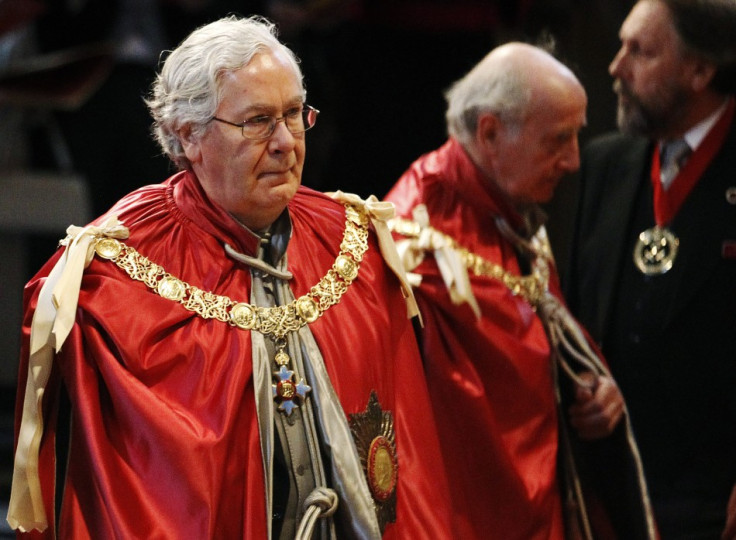Mervyn King's Channel 4 Interview Gets Easy Headlines But Misses Larger Concern

"If you put a family of beavers on the roof of the Sears Tower, they'll start looking for wood to build a dam."
That's the view of my favourite comedian, Adam Carolla, of the many bosses he's had in radio and television.
They don't do what's risky, he complains, or even what's creative. They do what they're trained to do, even when it's clearly not working.
You can't really blame the beaver, Carolla concedes, it's just what beavers do. It's their expertise. It's their instinctive skill.
It's hard, understanding that, to blame Jon Snow for his flat-footed interview with Mervyn King Thursday - the first live one-to-one the Bank of England Governor has given during his ten year residence on Threadneedle Street.
From mispronouncing the Bank's signature policy of quantitative easing (let alone understanding its design and purpose) to challenging the Governor on matters such as government debt targets, austerity policies and bank reforming plans, Snow went straight to the Westminster correspondent's playbook and followed it step-by-step.
Politics is what Snow does best and that's where he felt most comfortable engaging King. No more so than when he practically dared him to use the politically incendiary (and utterly meaningless) phrase "green shoots" when the Governor was patiently trying to suggest the economy might be heading towards a very slow recovery.
It's also the reason the mainstream British press chose to headline the topic of government debt targets from the twenty minute interview. At present, there's nothing more political in this country than the current "austerity versus stimulus" debate and if journalists have the chance to catch the government out in a perceived inconsistency ("you said spending cuts would lower debt; now you're saying they won't) they're going to go for it.
King's sensible explanation for this (debt as a proportion of GDP won't fall unless GDP improves, and that won't happen if the rest of the world slows or slips into recession) is hardly revelatory. And it's really more of a statement of fact as opposed to an edorsement of policy.
But it does raise a very uncomfortable question.
And given the fact that it's a political one, I'm a bit amazed that so few people - including Snow - have bothered to ask it.
Why on earth is the Bank of England Governor sharing his views on the central plank of the government's most important policy on the eve of one of its party's annual conference and only hours before it releases figures that show a record August deficit?
Wasn't the Bank famously given independence from government control by Gordon Brown in 1997? Didn't King himself boast at his final Mansion House address that the Grey Lady was "an independent central bank with over three centuries of history".
The golden opportunity to press King on this fact would seem not only far more comfortable turf for Snow and his colleagues but also far more germane than the mis-directed emotive and quite frankly clichéd questioning about pensioners "losing out" because of quantitative easing, how it "benefits the rich" and banks being "bailed out" by the taxpayer.
Could this be the reason King chose to do the interview in the first place?
The highly intelligent Bank of England Governor - who's headed for exit next year and the lucrative anonymity retirement is likely to provide - is acutely aware of the fact that even in his final months in office he can't be blamed for government policy.
He's also articulate enough to surround the explanation for missing his own forecasts on growth and inflation on easy-to-grasp things like the European sovereign debt crisis and the global economic slowdown.
Skilful deflection of these sorts of questions is no more of challenge for King than a simple arithmetic Sudoku, and, in truth, offers about as much value to the viewer.
But what's certainly priceless to Chancellor George Osborne is the tacit support of his economic policy - just, it would seem, as it faces its sternest test in the form of rising debt, falling tax revenues and increased spending on social benefits.
In other words, what's happening on paper - and by that I mean recorded figures, not academic theory - is the exact opposite of what's being claimed by him and his government.
Challenging Osborne on this is perfectly legitimate, particularly when the overall economy remains stuck in the mire of double-dip recession and the austerity theory is being questioned from all sides of the political spectrum.
Giving the supposedly independent Bank of England Governor the opportunity to opine on this policy either way - and then not to challenge him on Bank independence when you claim he's just endorsed it - is something else altogether.
This isn't the tricky mechanics of monetary policy or Taylor Rule interest rate setting guidelines. This is the solid wood foundation of the archetypal political beaver dam.
It's a shame King was allowed to find the escape hatch so easily.
© Copyright IBTimes 2025. All rights reserved.





















